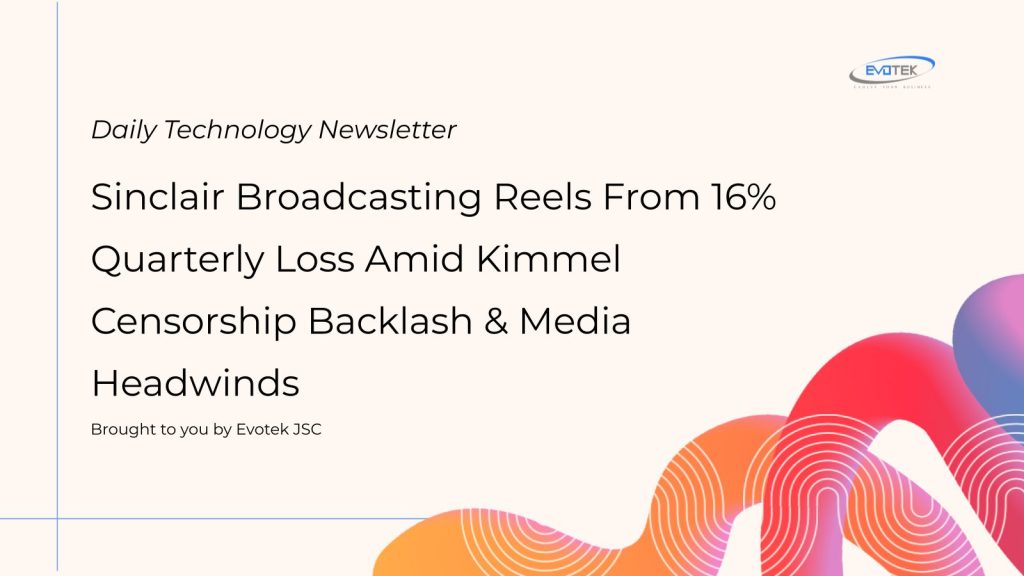Media giant Sinclair Broadcasting is facing significant financial challenges, reporting a substantial 16% quarterly loss. This downturn comes on the heels of several controversies, including a widely publicized attempt to censor late-night host Jimmy Kimmel for critical remarks about the former President, and ongoing struggles in a rapidly evolving media landscape.
The Kimmel Controversy: A Costly Misstep
You might recall the uproar when Sinclair, known for its right-leaning editorial mandates across local stations, collaborated with the Trump administration in an effort to silence Jimmy Kimmel. The comedian’s criticism of the President prompted Sinclair to pre-empt his show on many of its ABC affiliates. This move triggered a wave of public outrage, ultimately forcing the broadcaster to reverse course and reinstate Kimmel.
Even after initially backing down, Sinclair reportedly attempted to extend the pre-emption, demanding an apology from Kimmel for what many saw as legitimate political commentary. Their efforts proved futile, as they received neither the extended blackout nor the requested apology.
Financial Fallout and Lack of Transparency
Sinclair Broadcasting’s latest earnings report reveals the company’s predicament, showing a steep 16% quarterly loss. The full extent to which the Kimmel backlash, including potential advertiser withdrawals or viewer boycotts, contributed to this loss remains unclear. The company itself has been notably silent on the matter, offering no discussion of the incident in its earnings press release.
Furthermore, analysts and reporters participating in the earnings call largely sidestepped questions regarding one of the most significant events in Sinclair’s recent history. This lack of inquiry suggests a carefully managed environment, where uncomfortable realities, such as the potential business impact of partisan zealotry and censorship, are rarely confronted directly.
Broader Challenges Facing the Broadcast Giant
The Kimmel controversy is just one of several headwinds buffeting Sinclair Broadcasting. The appetite for overtly partisan content masquerading as local news is reportedly dwindling among the general public. Concurrently, the broadcast television industry continues its slow decline as audiences increasingly shift towards streaming platforms for their entertainment and news consumption.
Adding to its woes, Sinclair is currently embroiled in a retransmission dispute that has resulted in a blackout of its ABC affiliate stations on YouTube TV. This ongoing feud between ABC/Disney and Google has left Sinclair’s 38 ABC affiliates inaccessible to a significant segment of online viewers.
Hypocrisy in Regulatory Stance
Ironically, despite actively lobbying for deregulation when it aligns with its business interests – for example, supporting the appointment of figures like Brendan Carr to the FCC, who critics argue undermines corporate oversight and market protection – Sinclair’s leadership now calls for government intervention. On the earnings call, Sinclair President and CEO Chris Ripley characterized the YouTube TV dispute as an “antitrust issue,” blasting both Google and Disney as “media giants” that have left local broadcasters “caught in the middle.”
This appears to be a stark example of a company seeking a hands-off approach from regulators when it’s convenient for consolidation and predatory practices, but then demanding competent intervention when it faces its own challenges. Ripley’s ultimate goal seems to be the destruction of remaining media consolidation limits, enabling Sinclair to merge with competitors like Tegna and Nexstar, and further dominate the shrinking landscape of U.S. local broadcasting.
Such a contradictory stance rarely benefits consumers or fosters healthy market competition, underscoring the complex and often self-serving dynamics at play within the modern media industry.

 日本語
日本語 한국어
한국어 Tiếng Việt
Tiếng Việt 简体中文
简体中文